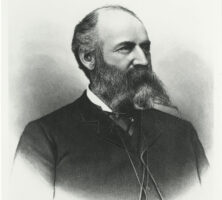Rufus Bullock was the first Republican to be elected to Georgia’s highest political office, serving as governor from 1868 to 1871.
Bullock was a northern-born businessman who cooperated with the Confederacy, became the most hated man in the state during Reconstruction, was forced from office by the Ku Klux Klan, and recovered enough of his reputation to become president of the Atlanta Chamber of Commerce and master of ceremonies at the Atlanta Cotton States and International Exposition in 1895. Still, until the 1990s historians generally accepted the negative view of Bullock gleaned from the partisan politics of Reconstruction, agreeing with the novelist Margaret Mitchell, who painted him as a carpetbagger and scalawag who looted the state.

Courtesy of Hargrett Rare Book and Manuscript Library, University of Georgia Libraries.
Rufus Brown Bullock was born on March 28, 1834, in Bethlehem, New York. When he was six years old, his father, Volkert Veeder Bullock, and his mother, Jane Eliza Brown, relocated the family to Albion, New York, and placed young Rufus in the Albion Academy. Upon graduation in 1850, Bullock became an expert in communications technology and, by 1855, managed the Philadelphia office of the American Telegraph Company. By 1860 Bullock had married Marie Elizabeth Salisbury of Pawtucket, Rhode Island, and moved to Augusta to manage the Southern Express Company under the general supervision of railroad entrepreneur Henry B. Plant. Even though he opposed secession, Bullock accepted the rank of lieutenant colonel and continued operating the telegraph, railroad, and freight interests for his company and for the Confederate quartermaster’s office.
When the war ended, Bullock entered politics, played a prominent role at the constitutional convention in December 1867, and won the election in April 1868 for governor over the Democratic favorite, John B. Gordon, a former Confederate general who was soon to become the head of the Ku Klux Klan. Bullock’s business connections to the North brought in investment capital to bolster the state’s economy by the rapid construction of railroads, schools, factories, and public buildings in connection with relocating the state capital from Milledgeville to Atlanta.
Bullock’s unwavering support for African American equality and officeholding and the principle of “one man, one vote” flew in the face of recalcitrant white supremacy, however, overwhelming all other issues and keeping his tenure precarious. He often traveled to Washington, D.C., to plead with U.S. president Ulysses S. Grant and the Republican Congress to support the military reconstruction in Georgia and to make a reality of the provisions of the Thirteenth, Fourteenth, and Fifteenth amendments. These actions condemned him in the eyes of Georgians who could not condone the changes wrought by the Civil War (1861-65). They began a “Lost Cause” campaign to return Georgia to Democratic rule. When the 1870 election returned a Democratic majority to the legislature, Bullock secretly resigned and fled to New York. Critics increasingly denounced Bullock and manufactured a false picture of his actions by filling Georgia newspapers with unsubstantiated slander, invective, and charges of corruption.
In 1876 Bullock returned to Georgia and stood trial on various charges of corruption, conspiracy to defraud the state, and malfeasance. After the prosecution failed to substantiate its case and two Atlanta juries declared him not guilty, Bullock remained in Atlanta and became one of the city’s most prominent citizens. He was president of Atlanta’s first cotton mill, president of the English-American Loan Company, senior warden of St. Philip’s Episcopal Church, president of the Atlanta Chamber of Commerce, president of the city’s Commercial Club, vice president of the Capital City Club, and a member of the high-society Piedmont Driving Club. His significant role in organizing the Atlanta Exposition of 1895 included persuading Booker T. Washington to give a keynote address and acting as master of ceremonies for the opening day speeches.
Bullock and his wife left Atlanta in 1903 and returned to Albion, New York, where he died in 1907. On the day of his death all flags on public buildings in Georgia were lowered to half-staff in honor of his role in raising Atlanta to prominence in the New South. The Atlanta Constitution of April 28, 1907, praised him: “Few Georgians, whether by birth or adoption, did more real good for the state than he.” As a progressive governor he was unique until 1970, when another liberal thinker, Jimmy Carter, had the temerity to stand up for the constitutional guarantees of African American equality.






